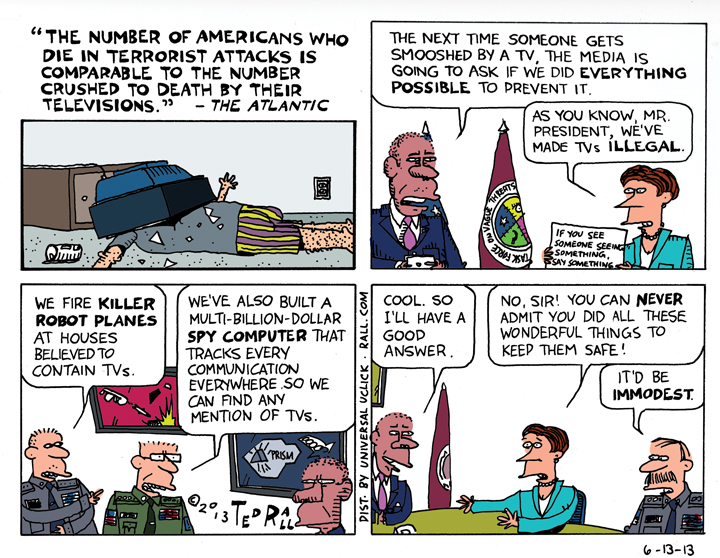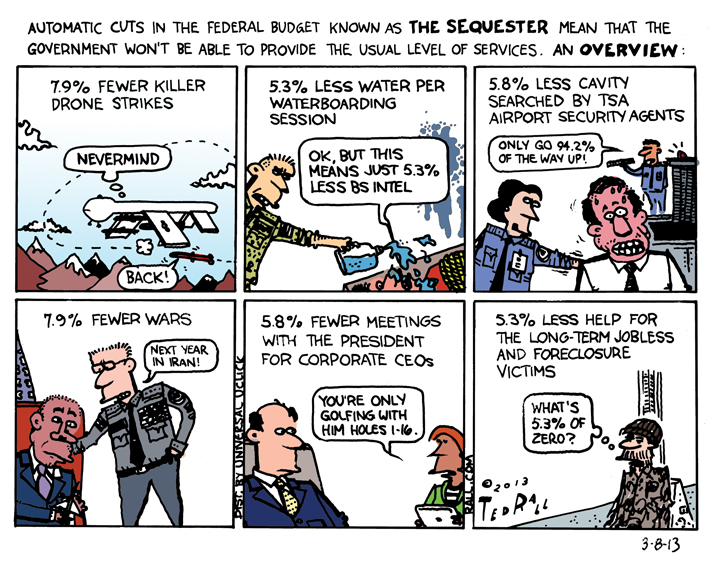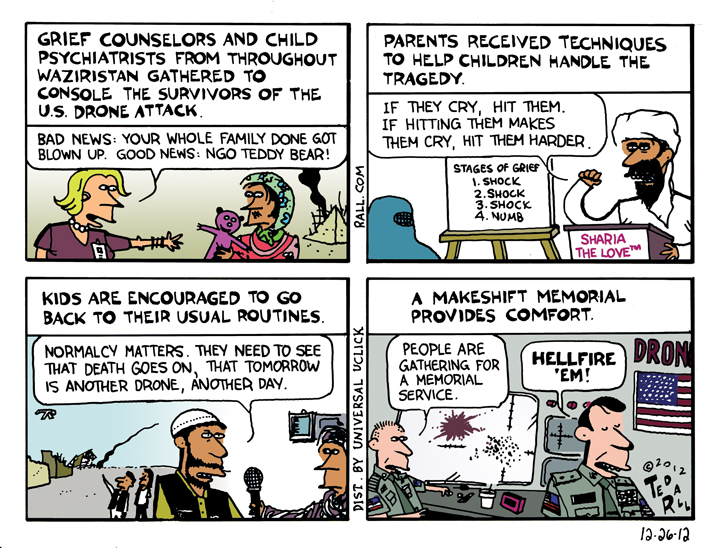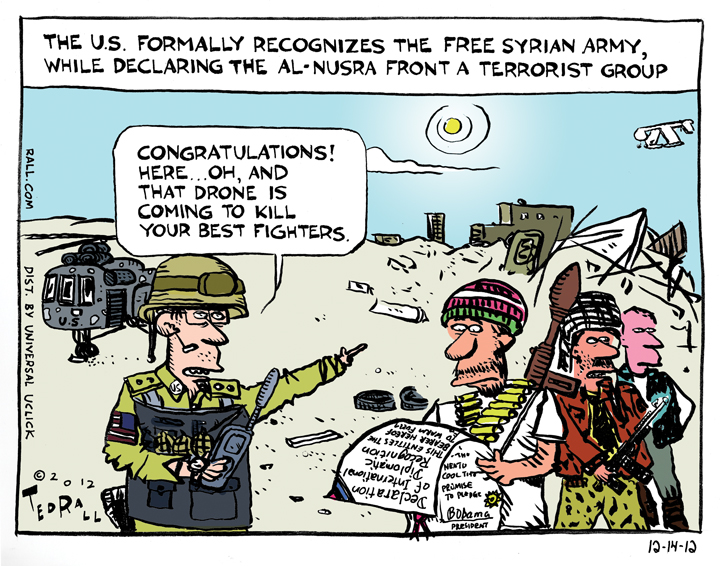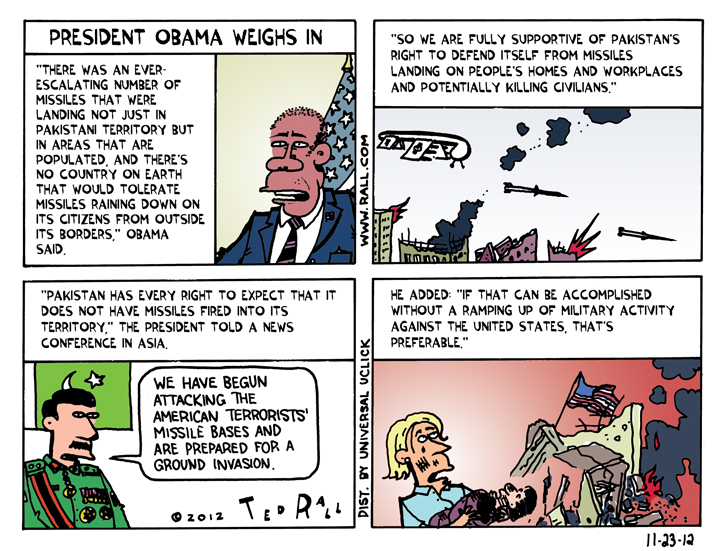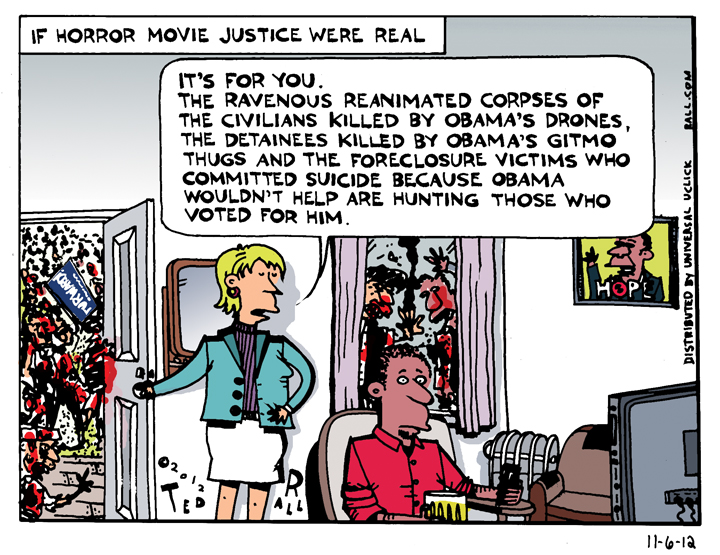The number of Americans who die in terrorist attacks is comparable to the number crushed to death by their televisions. So why are we building a vast surveillance state and conducting a violent drone war to prevent such a trivial threat?
SYNDICATED COLUMN: We Are All Soviets Now
Not-So-Secret “Secret Bombings” Have Big Implications
Did Israel bomb Damascus yesterday? Of course it did. According to Syrian rebel sources, 42 Syrian army soldiers were killed. But Israel – following its customary policy – won’t admit it. This has happened before. Usually, Syria doesn’t say anything about Israeli airstrikes. (The Syrian government’s complaint about Sunday’s airstrike is unusual, and thus cause for concern that the civil war might escalate into a regional conflict.)
According to experts, the official silence following not-so-secret secret bombings reflect the fact that even enemies have to cooperate sometimes. If Syria acknowledges that it has been the victim of what international law and anyone with a dictionary defines as an act of war, Syrian citizens and non-Syrians throughout the Muslim world would pressure the government of President Bashar al-Assad into a war it can’t win. Knowing this, the Israelis – who don’t want a war that could unite the fractious Arabs against them and set the Middle East ablaze – let Assad save face. By refusing to confirm or to deny, they quietly gloat over what everyone knows, that they can come and go as they please over Syrian airspace (or fire long-range missiles from Israeli territory, since even the Syrians don’t seem sure what hit them yesterday).
We live in a time that bears out the most dystopian of George Orwell’s predictions, yet even in a world of bluster and BS few news events are as surreal and mind-blowing as a so-called secret bombing. There is, after all, nothing secret about bombs. Especially when they fall into a densely populated metropolis. Certainly the families of those 42 dead soldiers are in the loop.
“Imagine an airstrike on a US weapons depot and no one claims responsibility,” the political cartoonist Kevin Moore tweet-asked. “Would we be so blasé about it?” We would be if we were a weak nation and the attacker was a strong one.
Not that this is a first-time occurrence.
Older readers remember the so-called secret bombing of Cambodia in 1969 and 1970, when President Richard Nixon ordered the carpet bombing of North Vietnamese supply bases in eastern Cambodia and Laos, a violation of international law. It was a sensational scoop for to readers of the New York Times and members of Congress (who hadn’t been informed), but if you were there, there was nothing secretive about the 100,000-plus tons of ordnance dropped in 3800-plus sorties by American B-52s.
Tens of thousands of Cambodians, including many civilians, were killed.
As far as the rest of the world was concerned, however, the bombings were cloaked by a conspiracy of silence. The international media found out about it right away but coverage was scant and tentative. Cambodia’s leader, Prince Norodom Sihanouk, supposedly sent his tacit approval through back channels; for its part, North Vietnam couldn’t say boo because they weren’t supposed to be in Cambodia either.
The US drone war in Pakistan bears similarities to Cambodia, though it features a delicious extra dollop of deception.
As I reported in 2010, the United States isn’t so much occupying Afghanistan as it is using eastern Afghanistan as a staging area to launch drone strikes against tribal areas in western Pakistan. Again we have the ridiculous spectacle of something that couldn’t possibly be less secret – Hellfire missiles streaming out of the sky from buzzing drones circling Pakistani cities in broad daylight and blasting homes and cars – while both the Americans firing the weapons and the Pakistani government whose territory they are landing on officially deny knowing anything about them. Although Pakistani officials either claim helplessness in the face of American military might or condemn the drone strikes outright, thousands of people have died in hundreds of attacks under the Bush and Obama administrations as the result of a brutal quid pro quo: the CIA kills political dissidents and other “enemies of the state” on the Pakistani regime’s hit list in exchange for the privilege of killing “terrorists” it deems a threat. (It recently came out that CIA drone operators fire blindly, without knowing who they’re killing.)
The United States has similar arrangements with Yemen and Somalia.
Oh, and the U.S. doesn’t even officially acknowledge that it has a drone program. It’s classified. If it exists. Even though Obama jokes about it.
I wonder whether the lawyered-up officials who gin up these pssst arrangements worry about the geopolitical implications. For at least 200 years – arguably since the Peace of Westphalia in 1648 – the Western world has been governed on the basis of strictly defined borders. In the postwar era the United Nations has served primarily as an attempt to enshrine the sovereignty of nation-states. At the core of contemporary international law is the doctrine that invading the territory or airspace is an act of war, particularly when the victim is internationally recognized as sovereign. So how does that square with secret bombings?
If Israel can carry out acts of war against Syria with impunity, without suffering any sanction, and if United States can do the same in Pakistan, who is to say which cross-border incursions of the future are acceptable and which are not? If Syria and Pakistan tacitly consent to their territory being bombed, but don’t sign formal agreements to allow it, can they legitimately claim to be sovereign independent states? It seems to me that both the bombers and the victim countries are messing around with issues with huge potential ramifications without thinking them through.
When political leaders wallow in “who are you going to believe, me or your lying eyes” absurdism, citizens roll their eyes and learn to reflexively distrust everything they see and hear from officials and in mainstream media. How, for example, can you take an Israeli government seriously that has had nuclear weapons since the 1970s but refuses to admit it (and sabre-rattles with Iran over its nuclear weapons program, which probably doesn’t exist)? Or a United Nations that refuses to call them to account under nuclear nonproliferation treaties?
The greatest enemy of political stability is alienation. Citizens don’t have to like their leaders to hand them the tacit consent of the governed. But if a regime wants to stay in power, the people have to believe their government more often than not. It can’t be perceived as totally full of crap.
Just ask Mikhail Gorbachev.
Sure, all rules are arbitrary. But once you start breaking your own rules, you undermine the basis of legitimacy for the system you’ve created and hope to perpetuate. If we go back to the basis of nationhood – you have a right to exist if you can carve out borders, defend them, and repel invaders – we unwind the world order that has been in place for nearly half a millennium. Which may be for the better. But it’s probably something that we should all discuss.
In the open.
(Ted Rall’s website is tedrall.com. His book “After We Kill You, We Will Welcome You Back As Honored Guests: Unembedded in Afghanistan” will be released in November by Farrar, Straus & Giroux.)
COPYRIGHT 2013 TED RALL
The Chechen Connection
Beginning in the mid-1990s under the regime of President Boris Yeltsin and continuing into the early part of the 2000s under Vladimir Putin, Russia fought a so-called “dirty war” against Chechen separatists in a region of the world that military strategists have long considered among the most indomitable. Even in Afghanistan, where many Chechen fighters went to train in Taliban run training camps, they had a reputation for ferocity that frightened many war-hardened Afghans.
As the younger brother, 19-year-old Dzhokhar Tsarnaev, who is the surviving suspect in the Boston marathon bombings six days ago remained silent and in serious condition in a Boston hospital, and apparently did not issue any public statement about motives, it is impossible to say why – if indeed it was him and his brother – they did it. So what follows is speculation.
We know that older brother Tamerlan – the name of the famous 15th century Central Asian conqueror – visited relatives in Chechnya for about six months in 2012, according to his father, in order to renew his Russian passport. Authorities are currently investigating the possibility that he connected with radical separatist groups during his visit. He posted videos by radical jihadi figures to YouTube when he returned.
Why might a Chechen resent the United States? After all, Russia – not the United States – blasted the capital city of Grozny into smithereens and made countless Chechens vanish into thin air, an act of ethnic cleansing similar to Kosovo. In fact, most Chechen resistance groups focus their rage – and terror attacks – against Moscow and other Russian cities.
Some Chechens charge the United States with a conspiracy of silence with Russia, which they see as an American ally. It is a credible charge. After all, the United States has maintained a close security relationship between the CIA and the successor to the KGB, the FSB, since 1994. That’s why, for example, Tamerlan’s trip to Russia aroused a query from the Russians to their counterparts in the American government.
If you think back to the Carter administration, which made human rights a top priority (albeit inconsistently), there was a time when political dissidents might be able to expect – not in all situations, but often – the US to decry human rights violations such as those that occurred in Chechnya in the late 1990s. Under Presidents Bill Clinton and George W. Bush, however, US policy was to refuse to comment or to issue low-profile denunciations that escaped the notice of the media. In the same way that so many governments failed to step up and help Jews escape Germany during the 1930s and 1940s, to do nothing (or very little) is to tacitly enable murderers. Silence equals consent.
Now scroll forward to 2013. The United States, which had nothing to say about Russian policy in Chechnya, is engaged in an epic clash of civilizations against Muslims in Afghanistan, Iraq, Yemen, Pakistan, Somalia and throughout sub-Saharan Africa, and Asia. (Just yesterday, an American terror drone killed two people in the Obama Administration’s extrajudicial campaign of slaughter of Yemenis.) It’s not a big stretch to imagine the suspects in the Boston marathon bombings thinking that the reason that the United States doesn’t care about what happened to their homeland is that it’s all part of the same policy, that the US and Russia are on the same side, that these two countries are more friends than enemies, Western powers who are trying to destroy Islam.
So why blow up the marathon? If you’re in Boston, you go with the targets that you have. That’s where you live. Why blow up innocents? Because you can’t get at those who were truly responsible, the policymakers in Washington and Moscow. And anyway, you tell yourselves, Americans aren’t really innocent. This is a democracy. We’re responsible for our government. We vote for our leaders. We should rise up and overthrow them if we don’t like them; otherwise, we’re responsible for them. This notion of “collective guilt,” after all, is how the Allies during World War II justified targeting civilians with bombing raids. Osama bin Laden made analogous claims that Americans deserved to be targeted because of their collective guilt.
Ultimately, you wage attacks in order to get attention for a cause that has been ignored. To get the issues you care about discussed and talked about. That’s the purpose of terrorism. Terrorism is the tool of the weak and oppressed against the strong and powerful. It’s asymmetric warfare.
While it will always be impossible to stop terrorism, it’s a fallacy to argue that we can’t reduce its frequency and the likelihood of American targets being attacked again, that we’ll always be targeted no matter what. It just isn’t true. Luxembourg doesn’t have a lot of terrorist bombings. Neither does Belgium – but it would if it still had its big colonial empire. If you don’t invade other countries, if you don’t engage in aggressive foreign policy, if you’re not financing and arming oppressive regimes, you tend not to piss people off.
One could argue that we shouldn’t give in to terrorists by changing our policies. But if our policies are brutal and counterproductive to begin with, it’s a discussion that we should be having.
Right now, to watch the news and watch the so-called experts talk about Boston, it’s pretty clear that they don’t get it. Skirting the issue, they talk about the psychological component, that the two brothers from Chechnya were to some extent alienated from American society. They talk about the success of law enforcement. They talk about privacy and cameras. The Republicans are even talking about this as an excuse not to legalize 11 million illegal immigrants.
But all of these issues are beside the point. The only surprise about Monday’s attack is that such horrific events are so few and far between.
SYNDICATED COLUMN: We Don’t Have the Right to Care
U.S. Drone Strikes Equivalent of Dozens of Newtown Massacres
We don’t have the right to be sad.
We don’t have the right to be angry.
We don’t have the right to care about the 20 dead kids, much less the six dead adults or the one deranged shooter.
Our newspapers don’t have the right to pretend that we are a nation stricken by grief. Our television networks don’t have the right to put the Newtown shootings at the top of the news.
We don’t have the right to gather around the water cooler and talk about how terrible it all is.
Our president doesn’t have the right to express grief or remorse or pretend to be a human being or reference the fact that he is a parent or wipe his eye (assuming he was crying).
Our pundits don’t have the right to use this massacre as a reason to call for gun control. Our Congress doesn’t have the right to use it as a reason to propose a single piece of legislation.
Until we start caring about other people’s dead kids—and their adults—kids and adults made dead by American weapons—we don’t have the right to mourn our own.
Every couple of days, our president orders drone attacks against innocent people in Pakistan, Afghanistan, Yemen, Somalia, and, no doubt, other places we are unaware of. But we don’t care.
There is no moral or legal justification for a single one of the more than 3,100 murders committed by the U.S. via drones. The guilt or innocence of the drones’ targets is never reviewed by any legal body (the White House won’t even say how they compile their “kill lists“), the dead never have a chance to confront their accusers, and in any case the offed “militants” are not threats to the American people. They are merely political opponents of repressive regimes allied with the United States.
Moreover, the vast majority of the victims are innocent bystanders (by one count 36 civilians per militant), members of the families of the target, or people who simply happen to be at the wrong place at the wrong time.
The Newtown massacre, so tragic and pointless, would be just another run-of-the-mill, made-in-USA afternoon in the places targeted by America’s campaign of aerial terror. On March 18, 2011, for example, a U.S. drone blew up between 17 and 40 civilians and policemen in the village of Datta Khel in the North Waziristan region of northwest Pakistan. This was part of America’s nasty “double-tap” strategy.
“As the drone circled it let off the first of its Hellfire missiles, slamming into a small house and reducing it to rubble. When residents rushed to the scene of the attack to see if they could help they were struck again,” reported the UK Independent.
Not an accident. Double-taps are policy.
And we’re OK with them.
Drone strikes approved by Presidents Bush and Obama have killed at least 168 children in Pakistan alone.
And in recent months, more than 100 people have been killed by unmanned aerial vehicles (UAVs) in the same area.
And we don’t care.
Actually, that’s not fair. The truth is, we’re pro-mass murder. Barack Obama makes Adam Lanza look like a peacenik, but we love him. A whopping 62% of Americans approve of Obama’s extrajudicial drone war.
Let’s give you, dear reader, the benefit of the doubt: let’s assume you’re one of the 38% of Americans who disapproves of one man acting as judge, jury and executioner of people half a world away, seen through a video feed taken thousands of feet up. The fact remains, you probably don’t lose a hell of a lot of sleep over the drone victims. Which is understandable. You don’t know them. They wear funny clothes. They do live, after all, half a world away.
Which is why reporters don’t cover their funerals. Why the Today Show doesn’t interview their grieving relatives. Why our politicians don’t shed tears (real or imagined) for them. Which is why we don’t ask each other:
“Why?”
Even the Left doesn’t care. Not much. America’s most recent major progressive movement, Occupy Wall Street, focused on economic injustice and corporate corruption. OWS hardly had a word to say about the drone strikes that killed so many children. America’s “liberal” media—NPR, The Nation, Mother Jones, etc.—barely mention them.
Which is fine. We have the right not to care about anything we want. Including dead kids. Even dead kids killed by our missiles. Even dead kids killed by a president we just reelected by a comfortable majority.
Since we have made a collective national decision to be a bunch of coldhearted bastards, however, we have to be morally consistent. And that means not caring about our kids either. Even when they are little, cute, white, and live in Fairfield County, an upscale suburb of New York City where many reporters, editors and other members of the national media reside.
We owe it to the little, cute, brown kids we’re killing in Pakistan. Stop caring about all kids.
“They had their entire lives ahead of them—birthdays, graduations, weddings, kids of their own,” Obama said of the Connecticut victims. That was equally true of the children Obama murdered—some whose snuff videos he watched. It is also true of the children Obama is planning to murder. “We’ve endured too many of these tragedies in the past few years,” the president continued.
Not that he cares.
(Ted Rall is the author of “The Book of Obama: How We Went From Hope and Change to the Age of Revolt.” His website is tedrall.com.)
COPYRIGHT 2012 TED RALL
SYNDICATED COLUMN: Shoot First, Justify Later
Our Police State Does What It Wants, Then Writes a Memo
Imagine that you were the president of United States. Now think what you would do if you or one of your advisers proposed an idea—a great idea, one that solved a big problem—that was radical to the point of possibly crossing the legal line into unconstitutionality.
You’d want to lawyer that sucker, right? After all, the last thing you would want to do is break the law. You wouldn’t want to be accused of running off half-cocked in violation of your inaugural oath to preserve and protect the Constitution. You wouldn’t want to risk a scandal, an investigation, or even impeachment.
Now imagine that you were a chief of police. Again, imagine that you or one of your officers came up with a great new approach for tracking down bad guys, but that the idea was so novel that you couldn’t be sure that arrests made using your new tactic would hold up in court. What would you do? I know what I’d do: I’d consult legal counsel. You probably would too. You’d want to know where you stood so that you and your policemen wouldn’t get into trouble, and your prosecutions would hold up in court.
Check first, act second. Logical. But that’s not how presidents or cops do things in today’s might-makes-right, do-what-you-feel-like-and-come-up-with-a-justification-for-it-later era.
Case in point: Since 2009 President Obama has ordered the CIA and the military to launch more than 300 drone strikes against people in Pakistan, Afghanistan, Yemen, Somalia and other countries, killing more than 2500 people–98% of whom were innocent, and the other 2% of which posed no threat whatsoever to Americans. (Obama killed those 2% as a favor to the U.S.-backed dictatorships they were fighting. According to The Times: “For at least two years in Pakistan, partly because of the CIA’s success in decimating Al Qaeda’s top ranks, most strikes have been directed at militants whose main battle is with the Pakistani authorities or who fight with the Taliban against American troops in Afghanistan.”)
All of these bombings and murders were committed minus the thinnest veneer of legal justification. However, now it has come out that during the final months of the 2012 presidential campaign, when polls showed that Mitt Romney had a chance of winning, Obama and his advisers gathered to begin work on a legal framework for the drone program, a set of rules that would determine how targets are picked.
“There was concern that the levers might no longer be in our hands,” an Obama official told The New York Times, speaking on condition of anonymity (always a good idea when gossiping about a boss with an itchy drone joystick).
“The effort, which would have been rushed to completion by January had Mr. Romney won, will now be finished at a more leisurely pace,” the leaker said.
Obama referenced his retroactive drone legalization project on October 18. “One of the things we’ve got to do is put a legal architecture in place, and we need Congressional help in order to do that, to make sure that not only am I reined in but any president’s reined in terms of some of the decisions that we’re making,” he told Jon Stewart.
Two-thousand five hundred dead men, women and children in, and that’s when they start hanging the legal window dressing? Isn’t this the sort of thing Obama should have thought about back in January of 2009? For that matter, shouldn’t George W. Bush, who originated the drone assassinations after 9/11, been required to put forward some sort of constitutional and legal basis before firing missiles at Afghan wedding parties?
You’d think Congress would take an interest in investigating such a radical expansion of presidential power. But no, in what passes for a democracy that’s supposedly protected from extreme behavior by a system of checks and balances and a separation of powers, the legislative branch took no interest whatsoever in a president—make that two presidents—who secretly claimed the right to murder anyone they please, even a U.S. citizen on American soil, without any accountability whatsoever?
This post-9/11 culture of top-down lawlessness has filtered down to local police departments, many of which have begun routinely searching the cellphones of suspects they arrest. During the Occupy Wall Street protests of fall 2011, many activists reported having their smartphones hooked up to police department computers and drained right in front of them, presumably to mine them for contact information and other data.
Phone companies told Congress that they turned over 1.3 million records in 2011 alone to police departments seeking location data, e-mails, text messages, phone records and other data about their customers—i.e., you and me.
It’s easy to see why cops would want to collect as much information as they can from those they deem to be criminals—although, under the system of laws we used to have, suspects are legally innocent until proven guilty—but how can they possibly justify enacting such a radical new policy before first obtaining authorization from the courts?
Most people want to think their political leaders and law enforcement authorities mean well and are using their powers wisely. And that’s what they want us to believe. In January 2012, for example, President Obama described the drone killings as “a targeted, focused effort at people who are on a list of active terrorists.” But, according to The Times, the program has broadened into something far more sinister and cynical that few Americans would support. For example, “the CIA and the military have carried out ‘signature strikes’ against groups of suspected, unknown militants…for instance, [random] young men toting arms in an area controlled by extremist groups.”
Unchecked power runs wild. Cellphones are one example. When New Yorkers file an NYPD police report that their phone has been stolen, the cops routinely subpoena your records beginning from the day of the theft. Cops are supposed to use the records to find the culprit.
In reality, however, New York’s Finest aren’t exactly pounding the pavement to find your nicked iPhone. What’s they’re really after, reports The Times, is a building its Enterprise Case Management System database, “a trove of telephone logs, all obtained without a court order, that could conceivably be used for any investigative purpose.”
No wonder the Obama Administration’s Department of Justice—which is charged with protecting your rights—says cellphone users have “no reasonable expectation of privacy.”
Why are these guys getting away with murder—literally? Because we’re letting them.
(Ted Rall‘s is the author of “The Book of Obama: How We Went From Hope and Change to the Age of Revolt.” His website is tedrall.com.)
COPYRIGHT 2012 TED RALL
President Obama Weighs In
President Obama expresses his support for Israel’s right to defend itself from Hamas missiles originating in Gaza. He even says it would be OK for Israel to invade. Does the same rule apply to Pakistan, currently under fire by American missiles? Is it OK for Pakistan to invade the United States in order to defend itself?

